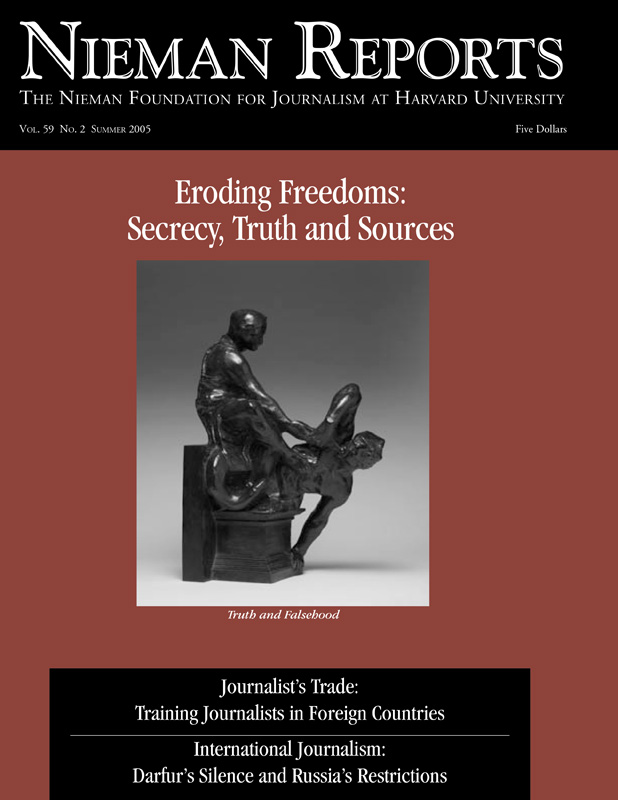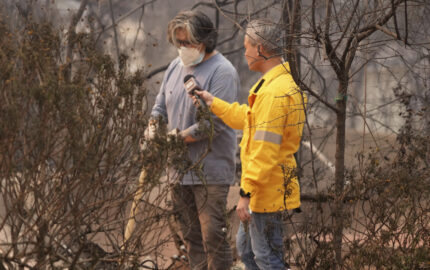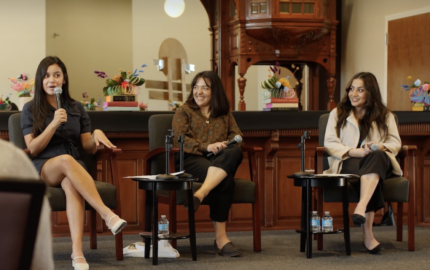
In the spring of 2005 Oxford University Press published “The Press,” the most recent installment in its ongoing series “The Institutions of American Democracy” that examine various democratic institutions. For this book, National Public Radio Senior News Analyst Daniel Schorr wrote a chapter entitled “Journalism and the Public Interest.” What follows are excerpts from his chapter.
“Congress shall make no law respecting an establishment of religion, or prohibiting the free exercise thereof; or abridging the freedom of speech, or of the press; or the right of the people peaceably to assemble, and to petition the government for a redress of grievances.” —The First Amendment to the United States Constitution
The First Amendment, ratified in 1791, its reach extended to the states by the 14th Amendment in 1868, makes the press the only private industry afforded specific constitutional protection. It was intended to protect printers and pamphleteers like Benjamin Franklin and Thomas Paine against censorship imposed by the politicians they criticized. The framers of the Constitution, who regarded a free press as vital to a democracy, could not have conceived that one day this cloak would embrace vast empires of newspaper chains, radio and television conglomerates, and Internet outlets that stretched the very meaning of journalism.
The press (now more commonly called the news media) continue to insist on constitutional shelter in the public interest while primarily serving substantial private interests and sometimes being accused of acting against the public interest.
The guarantee of press freedom has, since the 18th century, been subject to attacks, legal and otherwise …. [The U.S. Supreme Court has] generally heeded the advice of James Madison that “a popular government without popular information or the means to acquiring it is but the prologue to a farce or tragedy.” And the advice of Woodrow Wilson, “Everybody knows that corruption thrives in secret places and avoids public places, and we believe it a fair assumption that secrecy means impropriety.”
Since the terrorist attacks of September 11, 2001, the government has found other ways of influencing the press. One way is to appeal to patriotism at a time when the nation is engaged in a war against terrorism. In October 2001, Condoleezza Rice, then President George W. Bush’s national security advisor, arranged a telephone conference call with six television news executives, urging them to limit the use of videotaped addresses by al-Qaeda leader Osama bin Laden, which might have a negative effect on the American public and might even contain coded messages to al-Qaeda followers. Never mind that bin Laden’s statements are available to anyone with a satellite receiver. Most of the news executives agreed to cut back on the use of such tapes.
The tension between press and government about keeping secrets is heightened by the knowledge that classification goes far beyond real need, activated more by fear of personal embarrassment than a threat to national security. J. William Leonard, a National Archives official, testified before a House committee, “It is no secret that the government classifies too much information.”
Pressures on the media are enormous. Walter Isaacson, the former president of Cable News Network (CNN), has commented on the media’s constant whipsawing between “the Patriotism Police,” demanding support of the government, and “the Lapdog Police,” complaining of a too compliant attitude toward the government.
“In this war we need to return to our nation’s tradition of cooperation and self-defense,” said Attorney General John Ashcroft in a speech in June 2003.
The battle between secrecy and disclosure has generated periodic clashes over leaks and confidential sources. For the news media, freedom of press implies freedom to use information from confidential sources. The Supreme Court, in a 1972 decision [Branzburg v. Hayes], recognized a limited reporters’ “privilege” but said that it had to yield to the needs of grand juries for information that they could not acquire any other way.
In the early 2000’s, two major “sources” issues were being fought out before the courts. In Washington, five reporters representing The Associated Press, CNN, the Los Angeles Times, and The New York Times had been cited for contempt by a federal judge. They refused to answer questions about confidential sources in a civil defamation suit brought by Wen Ho Lee, a Los Alamos nuclear laboratory scientist who claimed he was wrongly accused of espionage. In another such controversy, reporters for The New York Times, The Washington Post, and NBC News were subpoenaed by a special prosecutor investigating the leak in 2003 of the identity of Valerie Plame, a CIA undercover employee.
Hostility to the press often emanates from the Oval Office itself and sometimes with good reason. At least three recent Presidents could attribute their greatest woes to journalists and journalism. Richard M. Nixon was embarked on the road to disgrace in June 1972 because of reports in The Washington Post followed by those of other media organizations. The Post linked a breakin into Democratic headquarters in the Watergate office building to the Nixon campaign committee. There followed disclosures about disbursement of campaign money for illicit purposes and, in the end, a draft bill of impeachment in the House forced Nixon to resign. William Safire, a Nixon speechwriter then, quoted Nixon as saying, “The press is the enemy.”
Ronald Reagan, who once said, “I’m up to my keister in leaks,” was damaged by the Iran-Contra scandal that started, oddly, with a story in a little weekly magazine in Beirut, Lebanon, called al- Shiraa. Obviously planted by the Iranian authorities to embarrass the Reagan administration, the story revealed that former national security advisor Robert McFarlane had flown to Tehran with a planeload of antitank missiles, which he hoped to barter for the release of American hostages held by pro-Iranian terrorists in Lebanon. Subsequently it emerged that the proceeds of the arms sale were to be used to arm the Contra rebels in Nicaragua, something that Congress had specifically forbidden. The prestige of a popular President was shaken by the revelations that started with that little Beirut weekly.
Bill Clinton was started down the road to impeachment by the news media— in this case, the Internet. On the night of January 17, 1998, gossipmonger Matt Drudge posted word on his Web site that Newsweek magazine was working on a story of the President’s relationship with a White House intern. Drudge was quoted the next morning on ABC television, and within days the story was all over the print and electronic media, and the ordeal of President Clinton had begun.
In making Presidents accountable for their misdeeds, the press clearly served the public interest. Yet an oldtime journalist finds it a matter of sorrow that the press, at the height of its influence, is at a depth of its public approval. Protected by the Constitution as the guardian of the public interest, the news media are not regarded by most Americans as dedicated to the public interest as they strive for circulation, ratings and profits.
One Roper–Freedom Forum poll found that fewer than 20 percent of respondents rated journalistic ethics as high. Sixty-five percent thought that there are times when publication or broadcast should be “prevented” in the public interest. Did we win the fight over prior restraint in the Supreme Court only to lose it in the court of public opinion?
In the television world of today news has come to occupy a corner of a vast entertainment stage, sharing the techniques and values of entertainment. It is perhaps because of the blurring of the line between reality and fantasy that several journalists have tried to build careers on invented stories. In 1980 The Washington Post had to return a Pulitzer Prize awarded to Janet Cooke for a made-up story about an eight-yearold child hooked on drugs. Two-thirds of the stories written by Stephen Glass for The New Republic between 1995 and 1998 turned out to be fabricated. The champion liar was Jayson Blair, who filed many stories for The New York Times using false datelines naming places Blair had never been. In 2004 Jack Kelley resigned from USA Today after a series of dramatic but untrue stories, such as witnessing a suicide bombing in Jerusalem.
Opinion polls beginning in the late 1990’s have registered growing public distrust of the increasingly concentrated, profit-driven news media. In 2002, 46 corporations controlled more than 50 percent of the news media—an array that included some 1,800 daily newspapers, 11,000 magazines, 2,000 television stations, and 11,000 radio stations. All of the principal television networks are extensions of large corporations— ABC’s parent company is the Walt Disney Company, NBC’s is General Electric, Viacom owns CBS, and Time Warner, CNN.
On February 22, 1971, more than a year before Watergate, President Nixon, his words recorded on Oval Office tape, remarked to his counsel, John Dean, “Well, one helluva lot of people don’t give one damn about the issue of the suppression of the press ….”
Cynical, but perceptive. Yet no one demonstrated better than Nixon that, for all its faults and failings, the press, at crucial moments, is there to defend the public interest.


